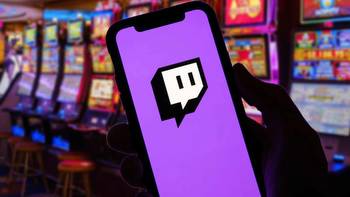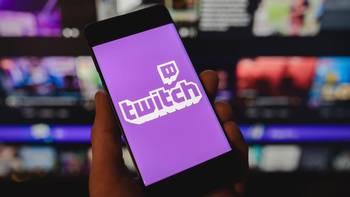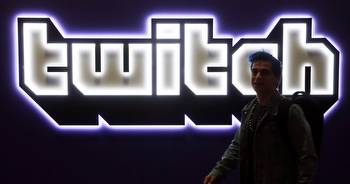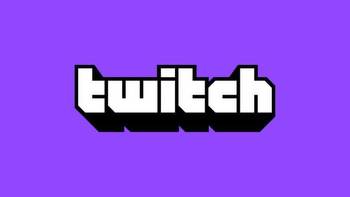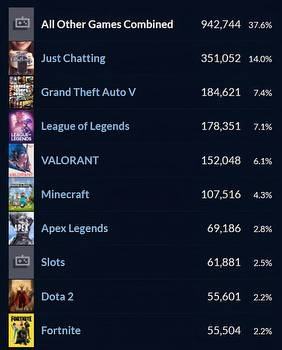Twitch Limits Top Creators’ Revenue, Bans Some Gambling Sites
Twitch is making big changes to its platform. The streaming platform has moved to counter overseas gambling companies from leeching off of Twitch users, but almost in the same breath announced they were cutting the top pay of the biggest Twitch streamers.
In an update released late Tuesday, Amazon-owned Twitch said they would be changing their policies to ban unlicensed gambling sites that include slots, roulette, or dice games, citing popular sites like Rollbit.com, Stake.com, and Duelbits.com. Though they’ll still allow the more commonly accepted forms of gambling like sports betting, fantasy sports, and poker.
The question of gambling on Twitch became a hot topic after Bloomberg released a report at the end of August noting just how popular gambling sites had become on Twitch, and that overseas casinos were partnering with streamers to lure watchers into gambling with crypto. Stake.com was cited heavily in Bloomberg’s reporting.
Twitch’s move against gambling comes after weeks of scandals involving high-profile Twitch users sucked into the parasitic world of gambling. ItsSliker, who currently maintains over 420,000 followers on Twitch, had been accused over the weekend of begging to borrow hundreds or even thousands of dollars from fans and fellow streamers alike. Content creators like Lukeafkfan, who maintains a sizable 174,000 followers, openly talked about lending Sliker $27,000 that went unrepaid.
Sliker’s alleged abuse has been documented thanks to a containing screenshots of discord chat logs showing ItsSliker asking for money from his viewers. The images show a consistent pattern where he asks for several hundred or several thousand dollars at a time and promises that he would return their money in a few days. He routinely claimed he had sponsorship deals that would allow him to return loans with interest.
Sliker admitted to many of the claims made against him by his fellow Twitch producers in an over-the-weekend stream, claiming it started with gambling on skins for Counter-Strike: Global Offensive before he became mired in the world of sports betting. He could have scammed fans and fellow content creators out of $200,000.
The August Bloomberg article noted that “slots” was the seventh most popular category for streaming content on Twitch, even more popular than Fortnite. As noted by Kotaku, several top streamers, including Pokimane, Mizkif, and Devin Nash mentioned protesting Twitch to get it to ban gambling streams.
Though some in the Twitch community like streamer Trainwreck noted the streaming platform is not totally addressing the problem at hand. ItsSliker was a self-admitted sports gambling addict. Noting that Sliker’s problem started with Counter-Strike, which has been heavily cited for its addictive quality, shows just how gambling has seeped into so many aspects of online culture.
Gizmodo reached out to Twitch to ask if it plans to address other problems with gambling on Twitch, but did not immediately hear back.
But the hits keep on coming. Dan Clancy, company president, wrote on Wednesday they were resisting calls to move streamers to a 70/30 revenue split while also limiting how much money some of the top streamers on the platform make. He wrote the vast majority of Twitch streamers share 50% of their net revenue with Twitch, but that over the years some of the larger streamers were offered “premium subscription terms” that gave them 70% of the total net revenue from subscriptions and other payments.
Starting in June, 2023, Clancy said streamers still on the premium deal would see the first $100,000 earned through subscription revenue still split 70 to 30 with Twitch. However, any revenue earned above $100,000 will be split 50/50.
Past reports had hinted that Twitch was planning to cut payouts to top streamers, so this latest announcement isn’t too surprising. What’s more interesting is Clancy’s stated reason for the change.
“We don’t believe it’s right for those on standard contracts to have varied revenue shares based on the size of the streamer,” the Twitch president wrote, adding that it shouldn’t affect 90% of those accounts with premium subscription terms.
Though Clancy acknowledged that many users were using feedback pages to beg for a full 70/30 split regardless of the size of their channel, but the company president tried to push revenue generators like the which he claimed has already increased overall streamer revenue.
The announcement comes as Twitch is feeling the heat of more competition with platforms like YouTube and TikTok which have tried to promote their own streaming services. Revenue made from TikTok streams is split 50/50 with the creators. Back in 2020, Google-owned YouTube poached three top streamers from Twitch to have them stream exclusively on its platform. Though it doesn’t seem like Twitch is losing out all too much. According to BusinessofApps, Twitch still remains at the top of the pile for quarterly hours watched compared to YouTube Gaming and Facebook Gaming as of 2021 maintained 9 million accounts that streaked at least once a month. The company claimed $2.6 billion revenue in 2021 which mostly came from advertising dollars.













